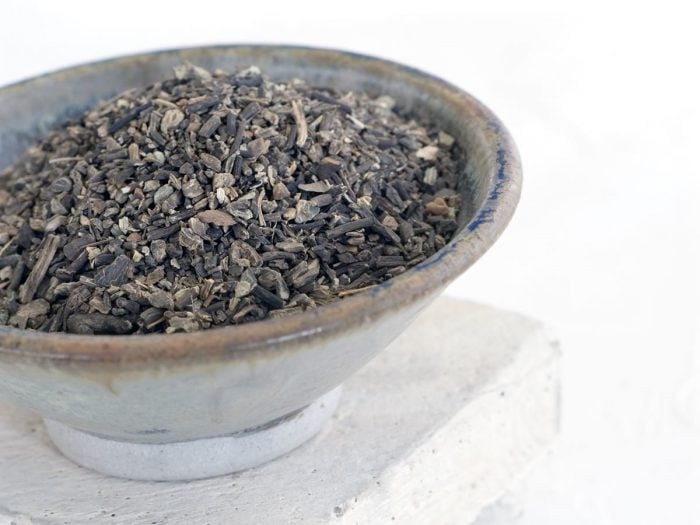The most important health benefits of black cohosh include its ability to reduce inflammation, ease menstrual and menopausal symptoms, eliminate spasms, lower blood pressure, regulate menstrual periods, improve the health of the immune system, promote restful sleep, prevent mood swings, and act as an analgesic substance.
What is Black Cohosh?
Black cohosh, with the scientific name of Actaea racemosa, is a flowering plant found primarily in central and southern North America, although it can occasionally be found in Canada as well. Although the plant itself can grow to be two feet tall and has flowering heads of yellow and white, the valuable part of black cohosh is found underground in the root. [1]
Cohosh root has been used as an herbal remedy for various indigenous groups in the Americas for thousands of years, and while many of those medicinal effects haven’t been scientifically validated, there is still a significant number of people who see black cohosh as a natural cure-all. While it used to be consumed in an untreated fashion, it is now primarily found in the form of a dietary supplement.
Due to its relatively narrow cultivation range, it is highly sought after by alternative medical practitioners. The active ingredients in black cohosh include serotonin-like compounds, as well as components that can mimic estrogen in the body. Furthermore, cohosh boasts triterpenes, isoflavones, tannins, essential fatty acids, and certain starches. As an analgesic, sedative, and anti-inflammatory substance, in addition to its now-famous role in the treatment and management of menstruation and menopause, black cohosh is an extremely valuable herb to add to your weekly regimen for both preventative and treatment measures. [2]

Black cohosh is most often used to control the symptoms of menopause, like headaches. Photo Credit: Shutterstock
Health Benefits of Black Cohosh
Health benefits of black cohosh include:
Anti-spasmodic
One of the earliest known uses of black cohosh was as an anti-spasmodic, which helps muscles and nerves function normally, preventing cramping and aching pains. This anti-spasmodic activity of cohosh’s active ingredients is coupled with natural analgesic and anti-inflammatory abilities, which makes black cohosh a one-stop herb for many aches and pains related with injury, muscle strain, chronic nervous tension, and other conditions. [3]
Anti-inflammatory Action
The salicylic acid found in black cohosh is extremely useful as a natural anti-inflammatory substance, as salicylic acid almost directly mimics the activity of aspirin. Next time you’re feeling like your head is pounding or your bones are aching, try an herbal supplement of cohosh instead!
For people who suffer from arthritis, black cohosh root can be a miracle cure, particularly when taken regularly. The anti-inflammatory nature of this herb also makes it useful for sore throats, congestion, and even high blood pressure. It works as a vasodilator, reducing the stress on the cardiovascular system and decreasing the chance of blood clots helping in maintaining a healthy heart. [4]
Reduces Menopausal Symptoms
Research has linked the estrogen-like compounds in black cohosh to milder menopausal symptoms, as the major problem for women going through menopause is the stark drop in estrogen levels. Supplementing your diet with black cohosh can actually replace hormone therapy, which many women seek out after “the change”. Other studies have linked the use of this cohosh to a reduction in hot flashes and night sweats for menopausal women, as well as lowered levels of stress and tension throughout the day. [5]
Improves Digestive Health
Research has directly linked black cohosh with alternative action, which means that the herb can increase the efficiency of nutrient uptake and improve the elimination of waste products, thereby reducing the chances of constipation and related conditions, including gastric ulcers. This digestive capacity of black cohosh can also help reduce flatulence, cramping, bloating, morning sickness, and nausea. [6]
Pain Management
The natural analgesic quality of black cohosh lends itself to plenty of pain-reducing applications, but it is particularly popular for women who have painful menstrual cycles and for women who are undergoing painful labor contractions. Furthermore, it is often administered when contractions are weak and labor is developing slowly. It is a healthy way to stimulate contractions and speed up the birthing process, which reduces the risks of labor and delivery. [7]
Promotes Restful Sleep
Aside from all of the other benefits of black cohosh, it is also a natural sedative. For people who suffer from chronic anxiety, stress, insomnia, or non-restful sleep, cohosh is often recommended, as it can deliver long, undisturbed, restful sleep, and get people back onto a normal sleeping schedule. That being said, black cohosh should not be taken in conjunction with other sleep aids, as the natural components are quite potent and complications could occur. [8]
Reduces Mood Swings
Black cohosh has a powerful impact on the hormonal balance of the body, as evidenced by its common use for menopausal and menstrual issues, but that hormonal potency also makes it useful for regulating mood and stress. If you suffer from mood swings or unpredictable bouts of stress, black cohosh can help regulate the release of hormones in the body and keep your mental state a bit more stable. [9]
Relieves Menstrual Discomfort
Although it is more prized for its impact on lessening the symptoms of menopause, black cohosh is also useful for managing unpredictable periods. It can stimulate menstrual bleeding and ease uterine tension, which reduces cramping during periods. For pregnant women, it also strengthens uterine muscle tone, thereby helping prevent miscarriage or premature delivery. [10]
Word of Caution: Despite the diverse applications of black cohosh for health, there have been reports of liver damage, particularly when use is long term. Also, some people do experience allergic reactions to cohosh, which normally take the form of dizziness, nausea, constipation, diarrhea, and headaches. Before adding this powerful herbal agent into your daily or weekly regiment, it is very important to discuss the decision with a medical professional. [11]
